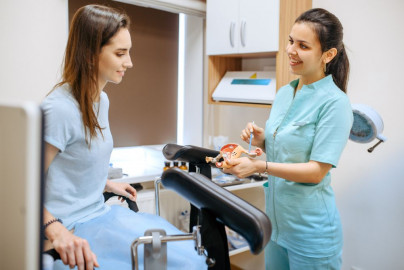Blog

What You Need To Tell Your Doctor During an Annual Exam
Every year, women aged 18 and older are advised to attend an annual exam with their gynecologist. This exam serves a few different purposes:
- To check in with your doctor
- To discuss changes or symptoms of concern
- To note if there is a need to start or change contraception
- To discuss family planning goals (if relevant)
- To discuss preventive care
What does my gynecologist need to know during an annual exam?
For women, gynecological annual exams are an essential part of maintaining quality healthcare throughout their lifetime. As such, it’s important to be upfront and honest about everything with your doctor during this visit. The truth is, your gynecologist is here to help, no matter your health concerns. We always encourage patients to address anything that has been on their minds. Here are a few things you might want to bring up during your visit.
Menstrual Issues
Your period symptoms should not be so severe that your quality of life is negatively impacted. Many women believe that they simply need to deal with severe periods. However, certain period symptoms, such as heavy menstrual bleeding, severe cramps, and more, are considered to be abnormal. These symptoms need to be addressed by a doctor. If you find that you are missing school, work, or other responsibilities because of your period, please be sure to let them know.
Your doctor should also be made aware if your period is irregular. An irregular period can be a symptom of an underlying health condition or potential fertility issue.
Trying to Conceiving
If you are trying to get pregnant, you should always talk to your doctor about it whether. Your doctor can provide information on preconception counseling and how to best prepare for a pregnancy. If you are struggling to conceive, talking to your gynecologist can be the first step toward understanding and fixing the issue. Women who are under the age of 35 should seek medical care after a year of trying without success, and women who are over the age of 35 should seek care after six months. You should also alert your doctor if you have experienced a miscarriage. Of course, if you have a known medical issue that can impact reproductive health, you should connect with your doctor when deciding to get pregnant.
Contraception
If you wish to begin using contraception or change your current form of birth control, your annual exam is when to let your doctor know. They will discuss your options and note which form of contraception is most likely to suit your lifestyle and needs. They will also review potential side effects.
Breast Changes
Breast changes are an essential piece of information to be communicated to your doctor. They include changes in shape, texture, appearance, lumps or bumps, pain, or discharge from the nipples. Women are encouraged to perform breast self-exams on a monthly basis at home. Your doctor will include a breast exam during your annual visit and discuss whether or not any further screening is needed.
Other Female Health Concerns
Additional items to mention to your doctor include:
- Vaginal issues, such as discharge, dryness, discomfort, and/or pain
- Changes in libido
- Mood swings
- Difficulties with tracking ovulation
- Menopause symptoms, questions, or concerns
- Postpartum difficulties
When it comes to female health, visiting your gynecologist every year is one of the most important steps you can take. We encourage you to contact your PGOMG provider to schedule your next appointment as soon as possible.
Back to blog